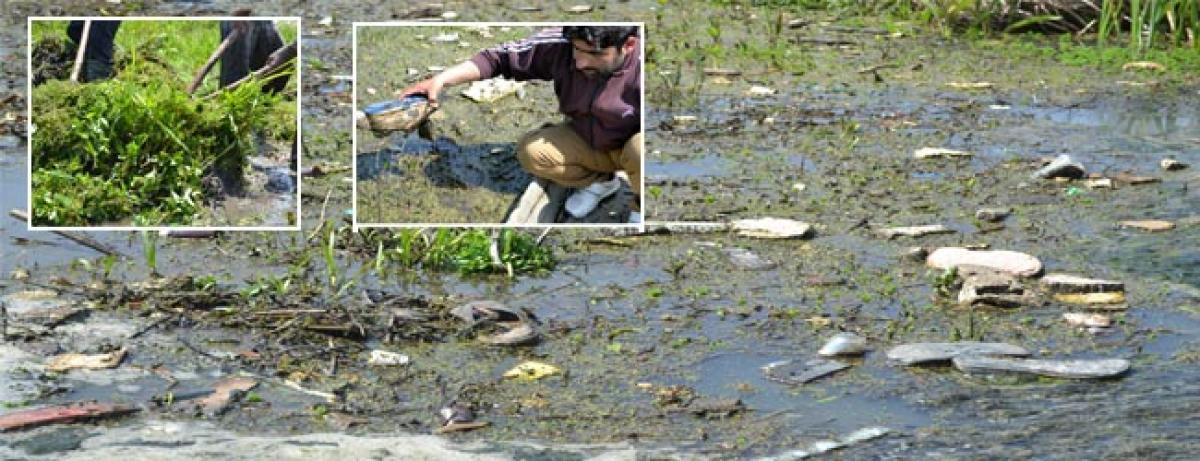Wetlands help offset terrible climate change impacts

The sprawling wetlands in Kashmir have long served as nature\'s first line of defence against an outbreak of violent floods the valley is so prone to. But the marshes are shrinking fast, increasing fears of a looming disaster similar to what it witnessed in 2014.
Hokarsar Wetland (Srinagar): The sprawling wetlands in Kashmir have long served as nature's first line of defence against an outbreak of violent floods the valley is so prone to. But the marshes are shrinking fast, increasing fears of a looming disaster similar to what it witnessed in 2014.
The decline has also robbed millions of Central Asian, Chinese and European winged visitors of their winter homes and habitat, posing an existential threat to the Valley's fragile ecosystem.
Not only that. The economic importance of these wetlands has always been highly undervalued, experts told this correspondent.
"Wetlands all around the world matter a great deal to humans. Kashmir is no exception but we often fail to recognize their importance," said Farooq Shah, a known green activist, who has been working and writing on Kashmir environment for the last nearly two decades.
"Economic and environmental benefits apart, these wetlands also help offset terrible climate change impacts," Shah said.
According to official records, the wetlands have largely fallen prey to paddy cultivation, plantation, and residential complexes. Shah attributed it to the human greed and an official apathy.
Official records reveal that nine Kashmir wetlands, despite being protected legally, have shrunk a great deal over the last 50 years.
Picture this.
Mirgund on the Srinagar-Baramulla highway towards the north of the valley had a total area of 100 acres. Some 20 acres encroached already.
Shalbugh, on the border of Srinagar and Ganderbal districts, was 250 acres. But land sharks have already grabbed 12.
Haigam in north Kashmir's Sopore was over 1,812 acres and nearly 252 have been usurped.
In Pampore, towards the south of the valley, four small wetlands had a total area of over 178 acres. But official records show only 150 have remained.
Similarly, Malgam wetland in north Kashmir Bandipore district was once spread over 1,125 acres. But today it is only 775 acres now. Thirty percent of the once vast marsh has been filled.
And this famed Hokarsar wetland was nearly 14 sq km. And today, it has shrunk to just 5-6 sq km only. According to the records, the depth of its waters has also substantially reduced from 12-14 feet to only a few inches now.
High pollution levels and blatant encroachments have wreaked havoc with its natural vegetation, leaving thousands of farmers in the lurch.
The growth of unwanted weeds, accumulation of silt, human and solid waste has drastically affected the growth of fish, water nuts and vegetables like lotus stems, officials said.
Imtiyaz Ahmad Lone, a wildlife warden, who looks after Hokarsar, blamed Jhelum flood basin for the "the devastation" because it "brings heavy volumes of silt and pollutants".
Besides, "some industry houses have also been found dumping waste" on the wetland peripheries which have become permanent grazing sites for cattle and "dumping ground for household and industrial trash", he said.
Lone noted that his department tried its "best" to restore the "lost glory" or at least preserve what is left of it.
"It needs a lot of resources, consistent government support," he said, adding the support has not been forthcoming.
The official said he personally has been persistently seeking a dredging machine to clear unwanted weeds. "I have been requesting the government to give me the machine for a few months. Got a negative response," Lone said.
He claimed the department has been acting tough against encroachers and, so far, more than 400 cases have been registered. He would not comment on a prosecution rate.
Shah, the environmentalist, said another flood in the valley would be more disastrous than in 2014 when large parts of Srinagar remained inundated for weeks together.
"We've sown the seeds of destruction and we're just reaping the bitter fruit now," he said.
"We lack a sense of ownership that largely has come from the instability in the region."
By Juvaid Trali
(The author is a Srinagar-based freelance journalist. He can be contacted at [email protected])

